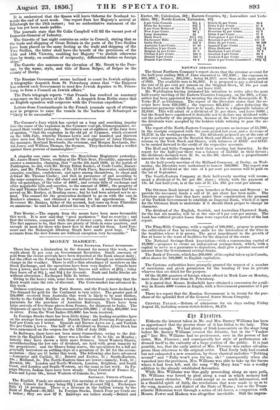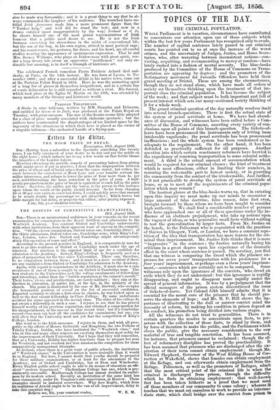ffiDz fiD4tairto.
Hitherto the interest taken in Mr. and Mrs. Barney Williams has been so apportioned that the greater share of it has fallen to the lady. This is natural enough. We had plenty of Irish lunnourists on the stage long before Mr. Barney Williams crossed the Atlantic, but in the "Yankee gal " line Mrs. Williams had no predecessor, save in the person of her sister, Mrs. Florence ; and consequently her style of performance ad- dressed itself to the curiosity of a large portion of the public. It is just possible, too, that the early arrival of Mrs. Florence was rather advanta- geous than otherwise to the original artist. That lively lady had created but not exhausted a new sensation, by those classical melodies " Bobbing around" and " Polly won't you try me, oh ? " consequently when she vanished into the provinces, Mrs. Williams was able to take up the furore where it had been left, and the song " My Mary Ann" was a worthy addition to the already established favourites. While Mrs. Williams was thus gaily proceeding along an open path, Mr. Williams was forced to plod along a road in which memory had planted many obstacles. We could accept as so much information, and in a thankful spirit of faith, the revelations that were made to us as to the song, manners, and dialect of the State of Maine ; but as the Trans- atlantic Hibernian went through a series of old farces, a comparison with Messrs. Power and Hudson was altogether inevitable. Still the impree-
lion ho made was favourable ; and it is a great thing to say that he al- ways commanded the laughter of his audience. The wretched farce en- titled Irish Assurance made him a more prominent figure than the " Yankee help," and well did he stand the test ; and now in a drama entitled (most inappropriately by the way) Ireland as it he shows himself one of the most genial representatives of Irish humour that a public need desire to see. He is not the Irish footman exercising his shrewdness in the midst of conventional life, but the son of the hog, in his own region, attired in most poetical rags ; and his countenance, his gestures, his dance, and his howl, are all careful studies wearing the appearance of spontaneous expression. That he and Mrs. Barney Williams, who plays an Irishwoman with great spirit, ren- der a long dreary tale about an oppressive "middleman" not only en- durable but amusing, is in itself a triumph of histrionic art.



























 Previous page
Previous page